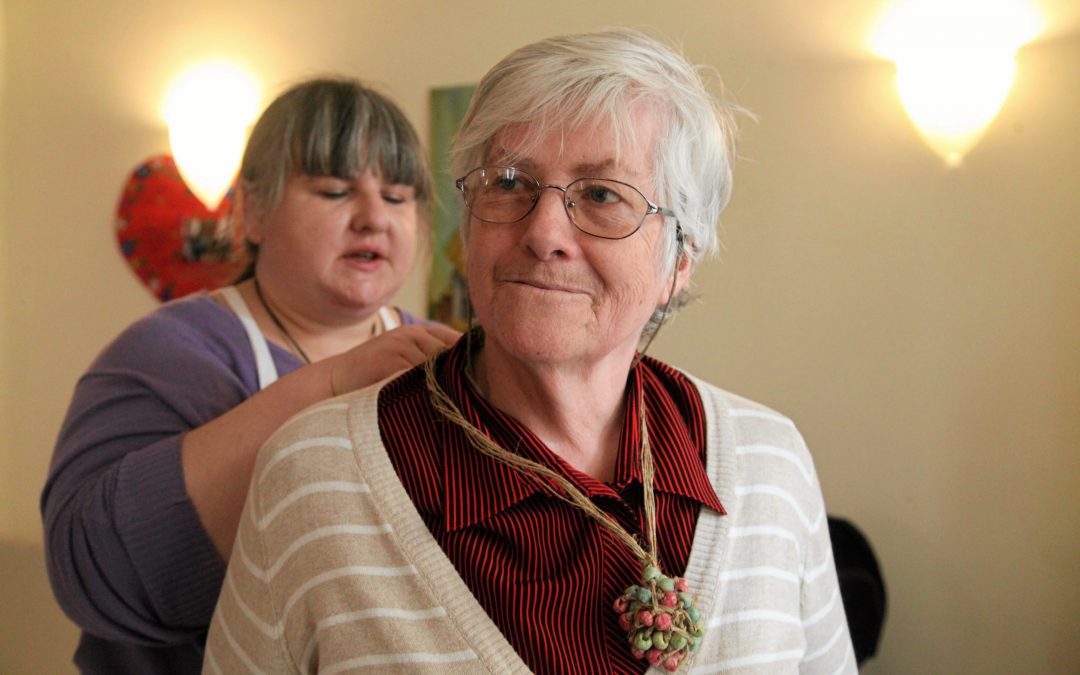by Veronika Warzycha
An advert on buses in Germany in 2020 prompted a storm of criticism in Poland and the intervention of diplomats. It showed an elderly lady accompanied by a younger woman, both smiling happily, with a text alongside them saying “Grandma’s new Polish woman” and directing people to a service, Procura24, that offers “Eastern European nurses for 24-hour home care”.
The image was widely criticised in Polish and German media, with Poland’s foreign ministry and embassy in Berlin calling for it to be taken down.
Reklama, która uprzedmiatawia kobiety, w dodatku na tle narodowościowym, nie powinna mieć miejsca w przestrzeni publicznej. Dlatego Ambasada RP w Berlinie będzie interweniować w tej sprawie.@PLinDeutschland pic.twitter.com/XUK1CeKarH
— S Szynkowski vel Sęk (@SzSz_velSek) May 30, 2021
But Procura defended the advert, saying it was “an accurate illustration of social reality”. However, bus operator Deutsche Bahn disagreed, and decided to remove the adverts as part of its “commitment to diversity”.
The episode highlighted the extent to which Polish women have become synonymous with the care sector in Germany, which urgently needs their labour but often treats them poorly.
The German Federal Statistical Office (Statistisches Bundesamt) suggests there are 4 million households in need of a caregiver in Germany. The majority are 24-hour caregivers, so-called live-ins.
There are around 300,000 such live-ins from eastern Europe – many of them from Poland – working in Germany, estimated workers’ union Ver.di.
But Justyna Oblacewicz of the Fair Mobility advisory network believes that the true figure is about twice as high, given that home care does not need to be registered in Germany, with many caregivers working illicitly.
Fair Mobility, which is supported by the German Trade Union Confederation (DGB) and Ministry of Labour and Social Affairs, seeks to build supporting structures for workers from Central and Eastern Europe in the German labour market.
Oblacewicz estimates that Polish live-ins in Germany earn on average about €1,300-1,400 euro per month. While this is “good money where they come from”, the conditions they face can often be exploitative, she says.
Ewa S., a Polish caregiver who has been working in German for seven years, recalls that the only thing she wanted to do in her first weeks when she started working was to sleep. She worked around 16 hours per day, every day. There were no days off. New job, new country, new language. “It was a disaster,” she recalls. 160 hours but only €1,000 euro to take home? Ewa stresses that even if she really worked just 40 hours a week the payment would still be too low by German standards.
Our piece with @KristinNoack on the impact of Corona on live-in care workers in Germany. The pandemic a magnifying glass for unsustainable care arrangements. Eldercare not a problem for families to solve individually through exploiting migrants @SFB1342 https://t.co/d20nDjKryM
— Anna Safuta 🇺🇦🇺🇦🇺🇦 (@annasafuta) June 21, 2020
Germany’s care system is a huge legal grey area. Even when working officially, conditions can be onerous. Even discussing work conditions is punishable under the terms of employment – under a contract that Notes from Poland obtained, the penalty would be €500 – but it also gives you an honorary mention in the unofficial “black list” that will prevent agencies from hiring a caregiver ever again.
Those coming to work as caregivers are mostly women aged between 55 to 66, says Oblacewicz. Kids grown up, in school or university, maybe divorced or widowed, and in need of money and a guarantee of a good retirement. These women decide to go where the money is, often without knowing German or having received an adequate schooling.
Ewa faced a difficult time after her husband died of cancer, soon discovering that it is not easy for a woman her age to find a job in Poland. Her sister suggested she go to Germany. It seemed easy and well-paid. She is not a qualified caregiver, but live-ins seldom are. Officially they are not allowed to practise any kind of medical care.
According to official information, there are around 600 agencies registered in Germany that match German families with the Polish caregivers provided by their Polish counterparts. Ewa signed a contract with one of them, but, facing unpaid overtime and working conditions she had not agreed to, decided to breach the contract. She says she was lucky, as the families she worked for helped her to learn about her rights and confront the agency. But not everyone is so fortunate.
Interesting post by @ElisaChie on 'The first CJEU decision on domestic workers: the role of EU equality law in challenging unjustified exclusions from labour rights and social protections'. https://t.co/grd4gDHkSg Case at https://t.co/gotsuMBBJY
— EU Law and Policy (@EULawPol57) March 11, 2022
For many, these contracts are the basis of the exploitation that Polish live-ins face. There is a term in Polish that makes all of this possible that does not exist in German: umowa zlecenie – a civil work contract. This contract exists between the Polish agency and the caregiver.
Some such agreements are called “trash contracts” (umowa śmieciowa) because they provide employees with few protections. These contracts give live-ins a status somewhere between self-employed and employed, which leaves them to pay a big part of their own social security – as well as the agency paying significantly less than they ought to – and cuts the agency out from a lot of responsibility regarding worker’s rights.
Moreover, according to Fair Mobility, the agencies also keep around 50% of the original payment by the German families. Many caregivers might have problems with the families or working conditions, but the contract prevents them from getting out of the work, as agencies refuse to pay wages or impose penalties for breaking the contract.
Grassroots Facebook groups – such as one with 4,300 members offering free legal advice to Polish caregivers in Germany – witness a never-ending game of “What would you do in my position?” They are the main channel for networking and connecting between Polish live-ins, who inherently work in conditions where direct contact is difficult, Ewa tells us.
Over 100,000 Ukrainian refugees have taken up work in Poland, according to new government data.
Around 75% are women and half are working in unskilled labour https://t.co/vjiAa20YOI
— Notes from Poland 🇵🇱 (@notesfrompoland) May 5, 2022
For Fair Mobility, the central task is legal advice and information. Sometimes they help with communication with agencies. However, in Germany there is as yet little relevant case-law, so there are no guarantees of success if the women decide to take an agency to court over an unfair contract.
Most woman give up when they realise the financial risk of having to bear the costs of a possible legal dispute, Oblacewicz admits. They don’t have many years left to work, so why risk it? There is huge insecurity on how to tackle the legal issue.
Politicians have previously shown little interest in establishing clearer rules and regulations. “The politicians knows about the situation of the live-ins”, says Oblacewicz, “but due to the complexity and the needs of the whole care-system they turn a blind eye.”
However, that might now change after last year’s election, since which time Germany has been led by the “traffic light” coalition of Social Democrats, Liberals and Greens.
The SPD’s representative for the Bundestag Committee on Health, Heike Baehrens, told Notes from Poland that her party has “reached an agreement with our coalition partners to place the 24-hour care in the family sector on a legally secure footing”.
Their plans include better support services for live-ins, as well as promoting household services and support families with a voucher system. The SPD advocates for control and accreditation of agencies, which Baehrens says includes “binding contracts, notification of social security, compliance with minimum labour standards, including clear regulations on working and on-call times and entitlement to self-determined leisure time”.
Last year, politicians from opposition party The Left made an appeal to the government about the working situation of live-ins. One of its authors, Susanne Ferschl, said that “Germany uses the pay gap between the countries so salaries seem more attractive. But that way second-class employees are created.”
Despite differences in Austria, Germany & Switzerland, the live-in care model in all 3 countries intrinsically builds on highly precarious working conditions for circular migrant workers https://t.co/nx2smHvHDW @RC02_ISA @LabourRc44 @jkulinz @goetheuni @uzh_geo
— ISA Global Dialogue (@isagdmag) January 29, 2022
She believes that the working conditions of live-ins have to be controlled and regulated, but also notes that “families are forced to use the [current] system because there are no financeable alternatives”. For Germany’s care system to work better and be fairer, it needs more funding. Otherwise “loopholes will still be sought and found”.
The live-ins themselves don’t have the energy, the means, or sometimes the knowledge to fight for better working conditions. The families that employ them also have little incentive to seek change. “If it does not work out with that live-in, the next one will be there,” says Ewa.
That leaves things up to activists, workers’ rights groups, and politicians. “It is scandalous what is happening, and it needs publicity,” says Ferschl. The topic of the live-ins’ situation has been discussed in the Bundestag previously, so there is hope that it will be again. In Justyna Oblacewicz’s words: “the ball is now in the politicians’ court”.
Main image credit: Mieczyslaw Michalak / Agencja Gazeta





















